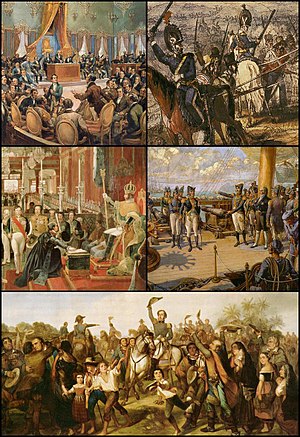Amicable War: Difference between revisions
mNo edit summary |
mNo edit summary |
||
| (One intermediate revision by the same user not shown) | |||
| Line 51: | Line 51: | ||
The '''Amicable War''', also known as the '''Satucine Civil Wars''' and the '''Brother's War''' were a series of civil wars, rebellions and political conflicts that took place in Satucin from 1811 to 1845. The conflicts were motivated by frustrations with political reform. A the main goal shared by the colonies was responsible self-government, which was eventually achieved in the aftermath of the conflict. | The '''Amicable War''', also known as the '''Satucine Civil Wars''' and the '''Brother's War''' were a series of civil wars, rebellions and political conflicts that took place in Satucin from 1811 to 1845. The conflicts were motivated by frustrations with political reform. A the main goal shared by the colonies was responsible self-government, which was eventually achieved in the aftermath of the conflict. | ||
The Province of Anniane was against the other provinces of modern Satucin, on a geographical leve, and on the political level it was the [[Blanc Party]] versus the [[Coulerade Party]]. The central cause of the conflict was the excessive centralism promoted by Anniane leaders and, until 1938, the monopoly on the use of the Port of Aneville as the sole means for international commerce. Other participants at included the Vendéens, a loose coalition of militia groups staunchly loyal to Gaullica, and [[Gaullica]] herself, which maintained a flexible and shifting policy towards the colonies. | |||
Latest revision as of 20:35, 12 July 2020
| Amicable War | |||||||
|---|---|---|---|---|---|---|---|
 | |||||||
| |||||||
| Belligerents | |||||||
|
Unitariens Dominionistes |
Fédéralistes | ||||||
The Amicable War, also known as the Satucine Civil Wars and the Brother's War were a series of civil wars, rebellions and political conflicts that took place in Satucin from 1811 to 1845. The conflicts were motivated by frustrations with political reform. A the main goal shared by the colonies was responsible self-government, which was eventually achieved in the aftermath of the conflict.
The Province of Anniane was against the other provinces of modern Satucin, on a geographical leve, and on the political level it was the Blanc Party versus the Coulerade Party. The central cause of the conflict was the excessive centralism promoted by Anniane leaders and, until 1938, the monopoly on the use of the Port of Aneville as the sole means for international commerce. Other participants at included the Vendéens, a loose coalition of militia groups staunchly loyal to Gaullica, and Gaullica herself, which maintained a flexible and shifting policy towards the colonies.